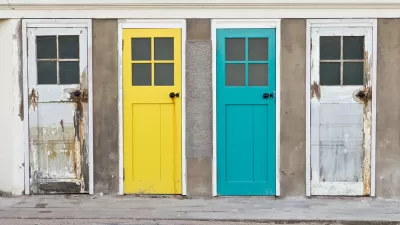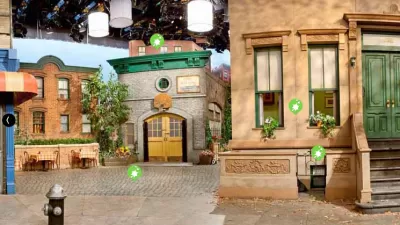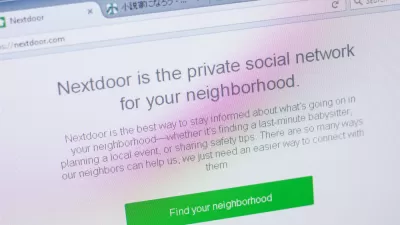A decade into its history, the hyperlocal social media site Nextdoor is looking for feedback and hoping to expand its reach before the 2018 and 2020 elections.

Carla Marinucci reports on the recent efforts of the San Francisco-based social media company Nextdoor, which is looking to expand its influence in the political arena after a decade of rapid growth and no lack of controversy along the way.
With regard to the company's rapid growth, Marinucci reports these statistics:
Since its founding a decade ago, Nextdoor has achieved penetration in over 70 percent of American neighborhoods — with eye-popping success in some of the country’s biggest cities, including San Francisco, where it’s active in 97 percent of all city neighborhoods, Chicago (85 percent), and Washington DC (81 percent). It recently launched in the United Kingdom, where it has already achieved 60 percent penetration in the country’s neighborhoods, the company says.
As planners and community activists in many of those areas know very well, "Nextdoor neighbor-to-neighbor discussions may — for good or bad — represent a new power to sway public opinion on issues and initiative, a challenge to traditional political campaigns."
Some of those discussions have attracted controversy. The company had to make changes to the platform after an article by Pendarvis Harshaw revealed problems with racial profiling on the site. A little over a year later, the site was reporting a 75 percent reduction in racist posts on the site.
For examples of the already realized positive potential of the site, Marinucci refers to several episodes experienced in the city of San Jose, including mobilization during a flooding event earlier this year, as well as mobilization of volunteers for the Beautify San Jose initiative.
FULL STORY: Nextdoor eyes 2018, aims for neighbor-to-neighbor approach in politics

Maui's Vacation Rental Debate Turns Ugly
Verbal attacks, misinformation campaigns and fistfights plague a high-stakes debate to convert thousands of vacation rentals into long-term housing.

Planetizen Federal Action Tracker
A weekly monitor of how Trump’s orders and actions are impacting planners and planning in America.

In Urban Planning, AI Prompting Could be the New Design Thinking
Creativity has long been key to great urban design. What if we see AI as our new creative partner?

King County Supportive Housing Program Offers Hope for Unhoused Residents
The county is taking a ‘Housing First’ approach that prioritizes getting people into housing, then offering wraparound supportive services.

Researchers Use AI to Get Clearer Picture of US Housing
Analysts are using artificial intelligence to supercharge their research by allowing them to comb through data faster. Though these AI tools can be error prone, they save time and housing researchers are optimistic about the future.

Making Shared Micromobility More Inclusive
Cities and shared mobility system operators can do more to include people with disabilities in planning and operations, per a new report.
Urban Design for Planners 1: Software Tools
This six-course series explores essential urban design concepts using open source software and equips planners with the tools they need to participate fully in the urban design process.
Planning for Universal Design
Learn the tools for implementing Universal Design in planning regulations.
planning NEXT
Appalachian Highlands Housing Partners
Mpact (founded as Rail~Volution)
City of Camden Redevelopment Agency
City of Astoria
City of Portland
City of Laramie





























